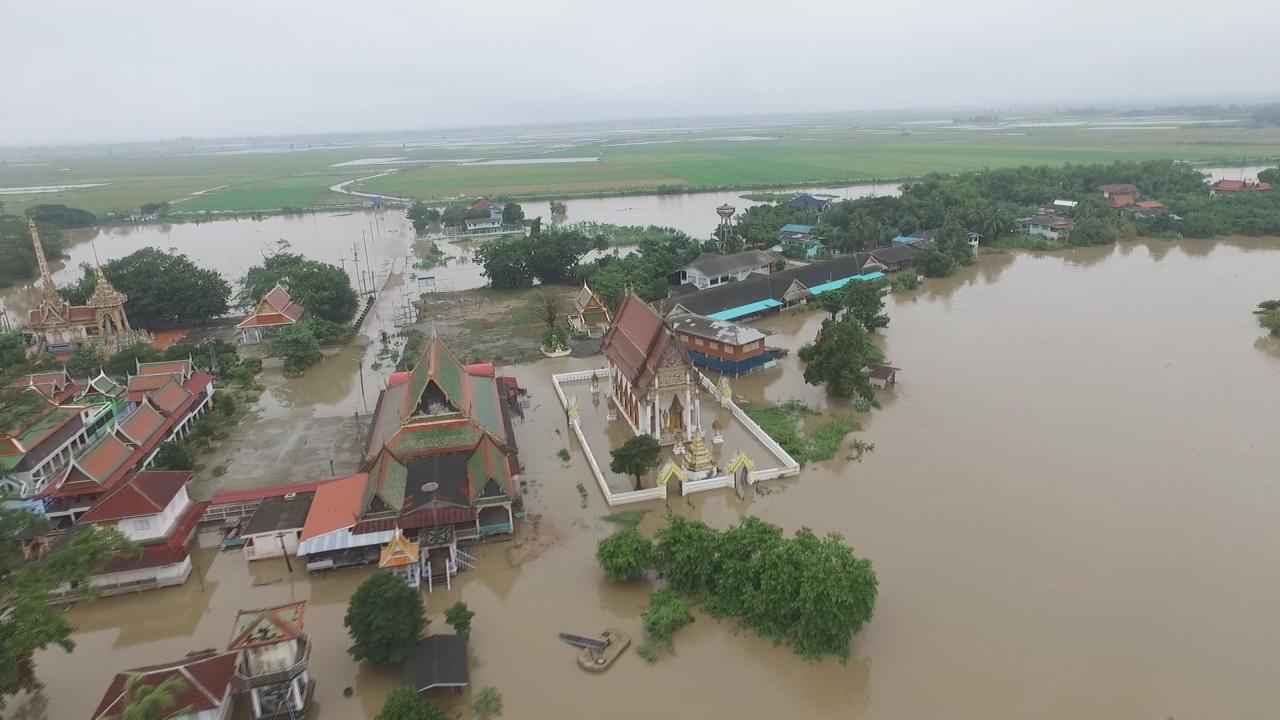
One and a half hour's drive from Bangkok is Bang Ban district of Ayutthaya. Here, most of the rice fields and entire villages have been under water for the past couple of months.
In some places, floodwater has risen to more than three metres, rendering even the second storey of houses inhabitable.
Bang Ban has been designated as a water-retention area, a so-called gaem ling or monkey's cheek. Each rainy season, farmers are asked to forego planting their fields in exchange for promises of recompense from the government.
But the promises have rarely been fulfilled, and villagers have resigned themselves to the fate that the government has dealt them.
This year's rains came fast and furious. Half the country suffered severe flooding. The rising water gave Thai people a real scare that there would be a repeat of the epic flood of 2011 when almost no area was spared.
Now that the rainy season is almost over, people are breathing more easily, except for those in areas like Bang Ban. All they can do is wait, maybe a month from now or whenever all the floodwater finds its way to the sea.
Next, the dry season will come visiting, and a drought crisis will follow. It sounds like a regular seasonal rhythm, but it's not.
Over the years, the cycle of rainy and dry seasons has gone haywire. It is now indisputable that climate change is largely responsible, but you wouldn't know it if you rely on news from the mainstream media.
Most news reports give details of the magnitude of property damage and flood victims' suffering. But then they stop there. Few make attempts to dig deep to the causes of this irregularity. And that lets the government off the hook in looking for long-term solutions.
Instead, officials seem to be satisfied with having repeated disasters. That gives them good reason to spend tax money. And when that happens, some of the money has a way of straying into the pockets of some unscrupulous people in authority.
However, severe flooding is only one manifestation of the threats posed by climate change.
Rising sea levels are causing coastal erosion all over the world, and Thailand with its long coastline is no exception.
The problem seems to have captured officials' attention, judging from the numerous projects to restore eroded beaches. After all, these areas contribute the bulk of tourism income to the country.
What I'm not sure about is how much thought has been put into the restoration work. People visiting the areas can see with their own eyes how they have been destroyed in the process of their restoration.
At most of these beaches, big sand bags were placed under them to prevent currents from washing the sand away. It did not work out so well. Now we see beaches of unsightly sand bags, more an eyesore than beautiful recreational areas.
In other areas, breakwaters or seawalls or some other types of engineering marvels have been constructed. These are equally unsightly and ineffective as they cause erosion elsewhere.
Numerous seaside community and civic groups have protested against the projects, to no avail unfortunately. But, frankly speaking, they may not know exactly how to deal with the problem either.
Plainly, if nothing is done, the erosion will keep eating up the coastline. The issue, however, is bigger than a group of inept officials or a bunch of civic groups can handle by themselves because the underlying problem is a global one.
As Thailand readies to open to the outside world, leaders across the globe are heading to Glasgow, Scotland, to discuss how to bring rising global temperatures under control.
Prior to this meeting, the UN's Intergovernmental Panel on Climate Change (IPCC) has issued a paper warning, in no uncertain terms, of global devastation if the temperature is allowed to rise beyond 1.5C over the pre-industrialisation level.
Currently, it is 1.1C over the baseline, and we have already seen the devastation it has wrought in terms of severe weather events, such as heatwaves, heavy precipitation, droughts, and loss of Arctic Sea ice.
Most industrialised countries have made impressive pledges to reduce CO2 emissions. Thailand has made its own pledge but at a much-reduced rate, which has drawn the ire of environmental groups.
My point of contention, however, is not so much the unambitious reduction of CO2 emissions. Rather, I question whether the policymakers and people with real power truly understand the issues of concern and their consequences.
In a speech to the UN General Assembly on Sept 25, Gen Prayut Chan-o-cha said in a prepared statement:
"… [D]ue to unbalanced growth and development, the world is facing a growing existential threat of natural catastrophes connected with climate change on an unprecedented scale. Over the past centuries, we have carelessly enjoyed and, at times, exploited planet earth's environment without listening to the repeated warning signals sent over time.
"We are now inevitably left with self-inflicted consequences that we have to bear for the next 30 years."
Impressive! But does he really understand what he said?
This is a legitimate question considering his past actions. He allowed many projects to go ahead that resulted in destruction of natural resources.
The most glaring example is the special economic zones such as the Eastern Economic Corridor, where large swaths of forestland were sacrificed while environmental laws have been suspended.
This lack of concern also shows up in projects in neighbouring countries in which Thailand plays a leading role that have permanently soiled the environment.
And judging from the clumsy ways in which natural disasters are handled, it's clear the government is ill prepared to deal with the underlying causes of the pending catastrophes that are certain to befall the country in the future.
It's an existential threat, indeed. But rather than learning about the threat and how to deal with it sensibly, the person at the helm seems more concerned about holding on to his seat of power.
